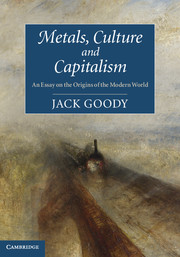Book contents
- Frontmatter
- Contents
- Maps
- Plates
- Preface
- Acknowledgements
- Chronology
- Part I Explorers
- 1 The Age of Metals in the Ancient Near East
- 2 A Bronze Age without bronze
- 3 Metals and society
- 4 Trade and religion in the Mediterranean
- 5 The coming of the Iron Age and classical civilisation
- 6 After the Romans
- Part II Merchants
- Part III Accumulators
- Appendix 1 The metallurgy of iron
- Appendix 2 Damascene steel and blades
- Glossary (with the aid of J. A. Charles)
- Bibliography
- Index
- Plate section
4 - Trade and religion in the Mediterranean
Published online by Cambridge University Press: 05 June 2014
- Frontmatter
- Contents
- Maps
- Plates
- Preface
- Acknowledgements
- Chronology
- Part I Explorers
- 1 The Age of Metals in the Ancient Near East
- 2 A Bronze Age without bronze
- 3 Metals and society
- 4 Trade and religion in the Mediterranean
- 5 The coming of the Iron Age and classical civilisation
- 6 After the Romans
- Part II Merchants
- Part III Accumulators
- Appendix 1 The metallurgy of iron
- Appendix 2 Damascene steel and blades
- Glossary (with the aid of J. A. Charles)
- Bibliography
- Index
- Plate section
Summary
In the earlier days of the Bronze Age one of the main reasons for interchange in trade or war was the search for metals. For while the river valleys of the Near East provided a perfect environment for intensive agriculture, and saw the first development of urban civilisation, it was not at all well endowed with the metals it needed, nor even with wood and stone. It was a Bronze Age without bronze. The essential copper and its alloy had to be sought elsewhere, in Oman, in Kandahar, in Pakistan, in Sinai, in Cyprus, in Spain and in Britain. The metals were to be found outside the confines of these valley societies, mainly in more hilly surroundings. In this way aspects of wider Bronze Age culture, ‘the culture of cities’, were spread throughout the region and elsewhere, as was also later the case in the Iron Age that originated in the hills of Anatolia.
Thus the search for metals did not occur so much within the Bronze Age communities themselves but meant travelling into the territory of ‘barbarian’ societies. To do that meant not simply locating the metals but often having to process them on the spot, or even to delve underground to dig them out. Some of this involved fox-holes, in other cases something more profound. Deep mining entailed the introduction of special methods, even the development of pumps, the use of the wheel, the installation of hauling equipment. Part of this technology of early civilisations was transferred to the Neolithic population who produced the ore; in particular this population learnt how to utilise the metals in warfare but also in peace, so that they were able to defend themselves against the power of the states and even to take the offensive by equipping themselves with the metal weaponry as well as by using their own innovations to achieve higher production. This process of the use and production of metals was occurring continuously on the boundaries of settled urban communities, leading not only to a spread of aspects of that ‘civilisation’ but subsequently to the very defeat of some of the centralised states by the ‘barbarians’ using their own weapons against them.
- Type
- Chapter
- Information
- Metals, Culture and CapitalismAn Essay on the Origins of the Modern World, pp. 62 - 84Publisher: Cambridge University PressPrint publication year: 2012



